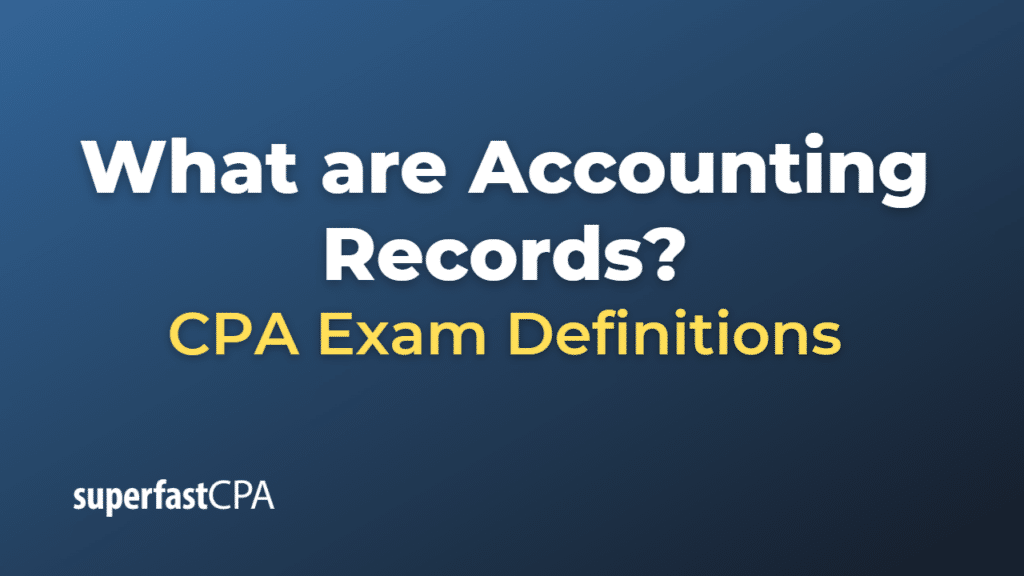Accounting Records
Accounting records are the organized and systematic documentation of a company’s financial transactions, events, and information. These records provide the basis for preparing financial statements, monitoring business performance, complying with tax and regulatory requirements, and making informed management decisions. Maintaining accurate and up-to-date accounting records is a fundamental aspect of a company’s financial management and accountability.
Accounting records include a wide range of documents and files, such as:
- Source documents: These are the original documents that provide evidence of a financial transaction or event, such as invoices, receipts, purchase orders, bank statements, and contracts.
- Journals: Journals are chronological records of a company’s financial transactions. They are used to record the details of each transaction, including the date, amount, and accounts affected, following the double-entry bookkeeping system.
- Ledgers: Ledgers are summary records of a company’s financial transactions, organized by account. They are used to track the changes in each account’s balance over time and to prepare financial statements.
- Trial balance: The trial balance is a worksheet that lists all the general ledger account balances at a specific point in time. It is used to verify the accuracy of the accounting records by ensuring that the total debits equal the total credits.
- Financial statements: Financial statements are formal reports that summarize a company’s financial position, performance, and cash flows. They include the balance sheet, income statement, and cash flow statement.
- Supporting schedules and reports: These include various analyses, reconciliations, and other reports used to support the preparation of financial statements and to provide additional insights into a company’s financial activities.
- Tax returns and filings: Companies are required to maintain records of their tax-related transactions and documents, such as income tax returns, sales tax filings, and payroll tax forms, to ensure compliance with tax laws and regulations.
Properly maintained accounting records provide a reliable and accurate representation of a company’s financial activities, enabling stakeholders to assess the company’s financial health and make informed decisions. Good recordkeeping practices also help prevent fraud, detect errors, and ensure compliance with accounting standards, laws, and regulations.
Example of Accounting Records
Let’s consider a hypothetical example of a small business, “Cafe Delight,” to illustrate the various types of accounting records they might maintain.
- Source documents:
- Invoices from suppliers for the purchase of raw materials, such as coffee beans, milk, and bakery items
- Receipts for utility payments, such as electricity and water bills
- Sales receipts issued to customers for their purchases
- Payroll records, including employee timesheets and salary information
- Journals:
- A sales journal to record daily sales transactions, including the date, invoice number, and amount
- A purchases journal to record the acquisition of raw materials and other supplies
- A cash receipts journal to track all incoming cash transactions, such as cash sales and payments from customers
- A cash disbursements journal to record all outgoing cash transactions, such as payments to suppliers and employees
- Ledgers:
- An accounts receivable ledger to track amounts owed by customers for credit sales
- An accounts payable ledger to monitor amounts owed to suppliers for purchases on credit
- A general ledger that consolidates all transactions from various journals and tracks the balances of each account, such as cash, inventory, and retained earnings
- A trial balance prepared at the end of the accounting period, listing all account balances from the general ledger to ensure that total debits equal total credits
- Financial statements:
- An income statement summarizing Cafe Delight’s revenues, expenses, and net income for the accounting period
- A balance sheet presenting the company’s assets, liabilities, and equity at the end of the accounting period
- A cash flow statement outlining the cash inflows and outflows from operating, investing, and financing activities during the accounting period
- Supporting schedules and reports:
- Inventory reports tracking the quantity and value of items in stock
- Bank reconciliations comparing the company’s cash records with its bank statements
- Aging reports for accounts receivable and accounts payable, showing the due dates and overdue amounts
- Tax returns and filings:
- Quarterly sales tax filings reporting the sales tax collected on Cafe Delight’s sales
- Annual income tax returns calculating the company’s tax liability based on its taxable income
- Payroll tax forms and filings, such as Form 941 for federal employment taxes and Form W-2 for employee wage and tax information
Cafe Delight’s accounting records provide a comprehensive picture of its financial transactions, allowing the business owner to monitor performance, make informed decisions, and ensure compliance with accounting standards and tax regulations.













